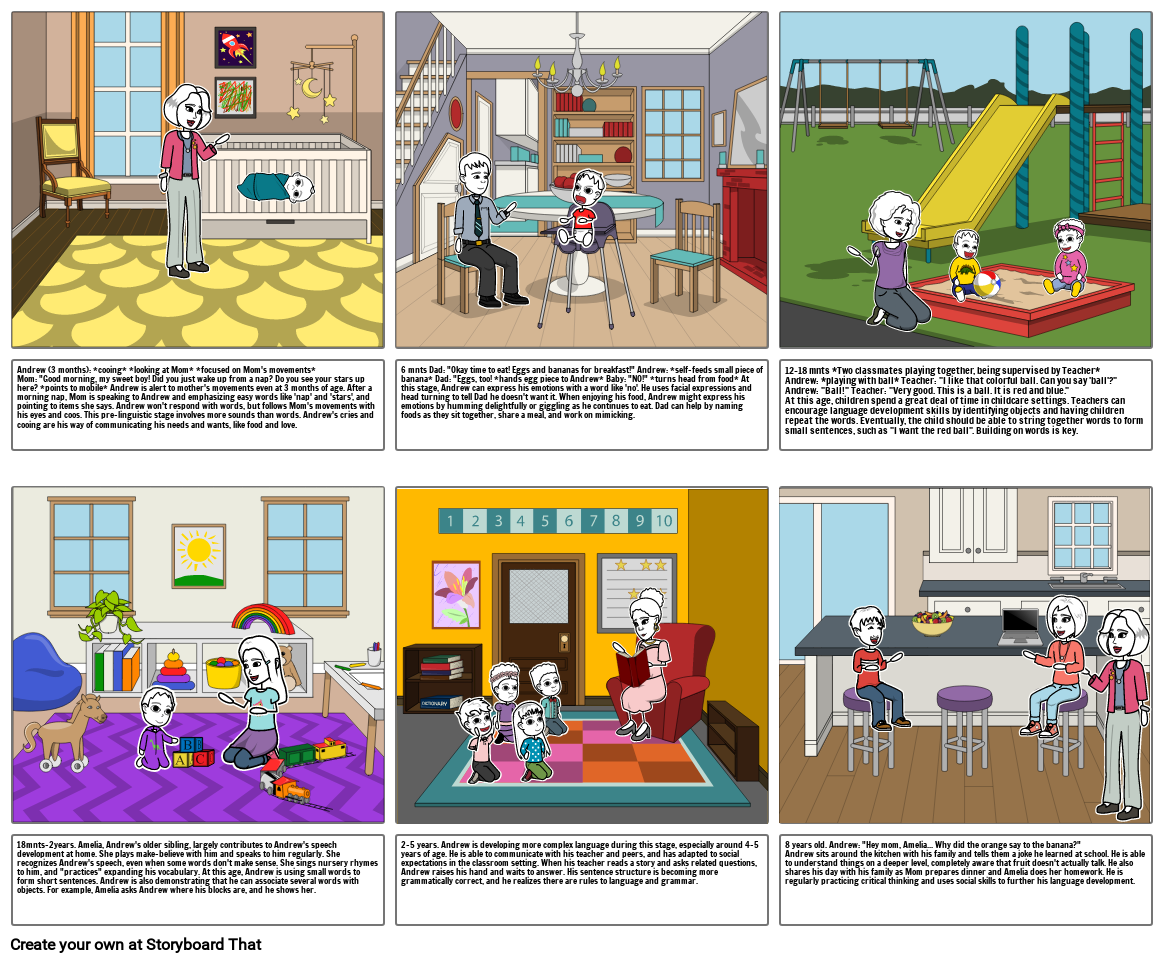Language Development

Storyboard Text
- Andrew (3 months): *cooing* *looking at Mom* *focused on Mom's movements*Mom: "Good morning, my sweet boy! Did you just wake up from a nap? Do you see your stars up here? *points to mobile* Andrew is alert to mother's movements even at 3 months of age. After a morning nap, Mom is speaking to Andrew and emphasizing easy words like 'nap' and 'stars', and pointing to items she says. Andrew won't respond with words, but follows Mom's movements with his eyes and coos. This pre-linguistic stage involves more sounds than words. Andrew's cries and cooing are his way of communicating his needs and wants, like food and love.
- 6 mnts Dad: "Okay time to eat! Eggs and bananas for breakfast!" Andrew: *self-feeds small piece of banana* Dad: "Eggs, too! *hands egg piece to Andrew* Baby: "NO!" *turns head from food* At this stage, Andrew can express his emotions with a word like 'no'. He uses facial expressions and head turning to tell Dad he doesn't want it. When enjoying his food, Andrew might express his emotions by humming delightfully or giggling as he continues to eat. Dad can help by naming foods as they sit together, share a meal, and work on mimicking.
- 12-18 mnts *Two classmates playing together, being supervised by Teacher*Andrew: *playing with ball* Teacher: "I like that colorful ball. Can you say 'ball'?"Andrew: "Ball!" Teacher: "Very good. This is a ball. It is red and blue."At this age, children spend a great deal of time in childcare settings. Teachers can encourage language development skills by identifying objects and having children repeat the words. Eventually, the child should be able to string together words to form small sentences, such as "I want the red ball". Building on words is key.
- 18mnts-2years. Amelia, Andrew's older sibling, largely contributes to Andrew's speech development at home. She plays make-believe with him and speaks to him regularly. She recognizes Andrew's speech, even when some words don't make sense. She sings nursery rhymes to him, and "practices" expanding his vocabulary. At this age, Andrew is using small words to form short sentences. Andrew is also demonstrating that he can associate several words with objects. For example, Amelia asks Andrew where his blocks are, and he shows her.
- 2-5 years. Andrew is developing more complex language during this stage, especially around 4-5 years of age. He is able to communicate with his teacher and peers, and has adapted to social expectations in the classroom setting. When his teacher reads a story and asks related questions, Andrew raises his hand and waits to answer. His sentence structure is becoming more grammatically correct, and he realizes there are rules to language and grammar.
- 8 years old. Andrew: "Hey mom, Amelia... Why did the orange say to the banana?" Andrew sits around the kitchen with his family and tells them a joke he learned at school. He is able to understand things on a deeper level, completely aware that fruit doesn't actually talk. He also shares his day with his family as Mom prepares dinner and Amelia does her homework. He is regularly practicing critical thinking and uses social skills to further his language development.
Over 30 Million Storyboards Created
No Downloads, No Credit Card, and No Login Needed to Try!
